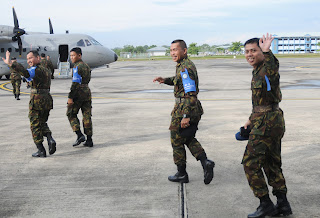 |
| Photo by Sim Y.H @ Media Permata |
Now let us see the picture below: - (Picture by Photojournalist David Bracho). This picture told the viewer a lot of things. Its either this army's daughter or this army try to save the little girl.
 |
| http://www.davidbracho.net/index.php#mi=1&pt=0&pi=1&s=0&p=0&a=0&at=0 |
Unlike this picture below. Not only the reporter have to take two version of it but also it has to come with a text report to explain the reader to whats going on.
As stated by Marshall McLuhan, (1964) on his book titled Understanding Media the extension of man, said, "Nobody can commit photography alone. It is possible to have at least the illusion of reading and writing in isolation, but photography does not foster such attitudes. If there is any sense on deploring the growth of corporate and collective art forms such as the film and the press, it is surely in relation to the previous individualist technologies that these new forms corrode. Yet if there had been no prints or woodcuts and engravings, there would never have come the photograph". (p.189)
Where as stated by Berbard Rubin, (1978) on his book titled Questioning Media Ethics, said that, "Standarized codes of ethics for the mass media are hopeful siigns, but their usefulness is limited. Other ethical resources are needed. I conclude that only a high ethical level of individual professional work by each of us in the media is the answer to the problem. The ethical standards of the media will be determined by the number of people who care. To the extent that we constitute a responsible public, public opnion is a powerful influence". (p.14)
I've been working as a reporter since 2006. First I engaged with government sector in doing news reporting with a free newspaper named Pelita Brunei. As I can't see the bright future in improving myself in journalism in that kind of newspaper, I took the risk and jump into Private Sector and worked with Malay Version newspaper call Media Permata. I can say that this paper is the Malay version of Borneo Bulletin. Since I'm with Media Permata, my press pass designation titled as Photojournalist. Which to my perception working as a Photographer and Journalist.
Until the Week-12 of our Visual Communication lecture, then only I knew that Photojournalist does not write a news report for their photo. Photojournalism is a profession that only took real photo without editing it at anyway. The question that still not answered by my bos is why did I take photo and do the news report? and why do my colleagues here take photo and edit it to make it even artistic? Am I consider myself as a Photographer cum Journalist? If so, they shouldn't put my post as Photojournalism. Does this company (the media authority here in Brunei) know the ethics of Photojournalism? Somebody got to do something about it.
Bibliography:
McLuhan, M. (1964). Understanding Media the extension of man. Routledge: London.
Rubin, B. (1978). Questioning Media Ethics. Praeger Publishers - Praeger Special Studies : New York, London, Sydney, Toronto.



No comments:
Post a Comment